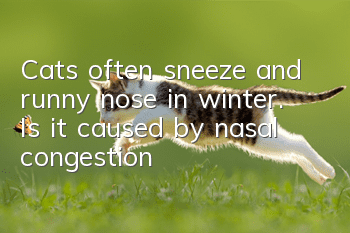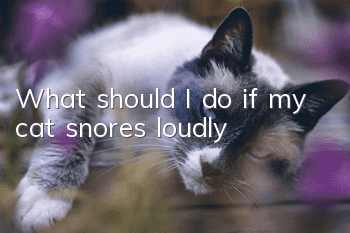Cats often sneeze and runny nose in winter. Is it caused by nasal congestion?

Cats often sneeze and have a runny nose or catch a cold in winter. Key symptoms include: occasional sneezing, normal body temperature, clear watery nasal discharge, and mild diarrhea. Cat owners should pay attention to taking measures to keep cats warm. Cats often sneeze and have a runny nose or have nasal congestion in winter, which can easily be confused with a cold. If you find that your cat has a purulent nose, you should send it to the doctor for examination in time.
Cats often sneeze or have a runny nose or catch a cold in winter
If a cat sneezes and has a runny nose in winter, it may be a precursor to a cold, and owners should be vigilant; main symptoms: occasional sneezing, normal body temperature, clear watery nasal discharge, and mild diarrhea.
Cause: ambient air pollution, normal reaction when stimulated by dust. Kittens with weak immunity or not drying in time after bathing in winter can cause colds. Pay attention to strengthening measures to keep warm.
Cats often sneeze and have runny noses in winter or it may be due to environmental reasons
It may be that the environment in which the cat is exposed is too dusty, causing the cat to become allergic, causing it to sneeze and have a runny nose. This reason is the best to deal with. You only need to clean the environment where the cat is, sweep away the dust, and give the cat a comfortable and clean environment. Shit scrapers should also pay more attention to maintaining a clean environment.
Cats often sneeze and have runny noses or nasal congestion in winter
Main symptoms: thick nasal discharge, loss of appetite, snoring during sleep, etc.
Cause: It is generally transmitted through the respiratory tract and digestive tract. Healthy cats can become infected with this disease when they come into direct contact with secretions or contaminated equipment, such as feed, water, utensils and the surrounding environment. Pay attention to timely medical examination to avoid delaying the best treatment time.
- Are fold-eared cats smart?
- What should I do if my cat is malnourished? How to tell if a cat is malnourished?
- Is Garfield easy to raise? Is Garfield sick because of a dry nose?
- What are the solutions to severe hair loss in cats?
- What is cat scratch disease? Will you definitely get cat-scratch disease if you are scratched by a cat?
- What should I do if my cat’s teeth fall out?
- How many years does a Ragdoll cat generally live? Pay attention to these feeding issues
- Should cats be shaved in summer? Is shaving cats good?
- Is it normal for a kitten’s anus to bulge?
- What do Persian cats eat? Persian cats like to eat warm food



